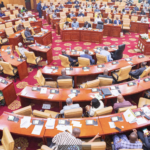
Parliament is braced for a potential boycott today as intelligence from the House suggests the Minority Caucus is likely to absent itself from the Chamber during the presentation of the 2025 Mid-Year Budget Review by Finance Minister, Dr. Cassiel Ato Forson.
According to Joy FM Parliamentary Correspondent Kweku Asante, the Minority has scheduled a series of activities away from Parliament at 12:00 PM, precisely when Dr. Ato Forson is slated to address the House.
This synchronized scheduling points to a deliberate strategy to express dissent and draw attention to their grievances outside the parliamentary chamber.
The Minority is reportedly set to present a petition to various key stakeholders, including President John Dramani Mahama, the Coalition of Domestic Election Observers (CODEO), and other civil society organizations.
While the specific aggrieved issues driving this protest were not detailed in the initial intelligence, such actions by the Minority are typically rooted in disputes over government policy, perceived procedural irregularities, or unaddressed concerns regarding national governance.
Parliamentary boycotts, while not unprecedented in Ghana’s Fourth Republic, are often employed by the Minority as a potent tool of protest.
They serve to deny legitimacy to government proceedings, particularly major policy statements like budget presentations, and to amplify their voice on issues they feel are not being adequately addressed within the regular parliamentary process.
Historically, Ghanaian parliaments have seen instances of Minority boycotts.
For example, during the NPP administration, the then-Minority NDC occasionally boycotted sessions over matters such as alleged human rights abuses or contentious loan agreements.
Similarly, the NPP Minority have walked out or boycotted sittings in the current administration, often protesting what they viewed as undemocratic practices or economic mismanagement.
Such actions can disrupt legislative business, though budget presentations, being constitutionally mandated, typically proceed regardless of the Minority’s presence.
However, a boycott effectively deprives the budget statement of the bipartisan scrutiny and debate that the parliamentary process is designed to foster.
It also sends a strong political message to the public and international observers about the state of parliamentary consensus and cooperation.
The Finance Minister’s Mid-Year Budget Review is a crucial parliamentary event, offering an update on the nation’s economic performance, revisions to revenue and expenditure projections, and potentially new policy initiatives.
A boycott by the Minority would undoubtedly overshadow the presentation itself, shifting public focus to the political tensions within the legislature.
Political observers will be keenly watching how the government responds to this potential boycott and whether it escalates the already strained relations between the Majority and Minority caucuses.
- President Commissions 36.5 Million Dollars Hospital In The Tain District
- You Will Not Go Free For Killing An Hard Working MP – Akufo-Addo To MP’s Killer
- I Will Lead You To Victory – Ato Forson Assures NDC Supporters
Visit Our Social Media for More



